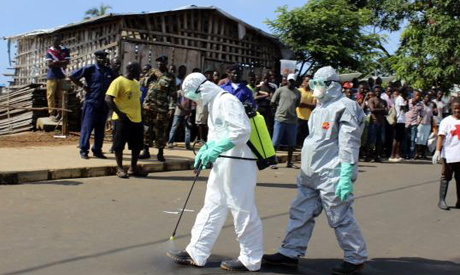
Health workers spray themselves with chlorine disinfectants after removing the body a woman who died of Ebola virus in the Aberdeen district of Freetown, Sierra Leone, October 14, 2014. (Photo:Reuters)
A British navy ship left Friday for Sierra Leone laden with personnel, aid and equipment to treat people infected with the Ebola virus as Prime Minister David Cameron appealed for other countries to do more to tackle the epidemic.
The RFA Argus, docked in Falmouth, southwest England, was waiting for high tide before departing on the 10-day journey, stopping at Gibraltar en route to pick up more supplies.
The civilian-staffed military medical support ship will carry materials to build medical units and help keep them supplied.
Some 80 medics and 80 marines are among the 350 people on board.
It will travel with three Merlin utility helicopters, air crew and engineers to provide transport and support to medical teams and aid workers.
Troops with landing craft will escort personnel ashore and protect teams deployed on the ground.
While the ship is equipped as a "floating hospital", Ebola patients will not be brought aboard, and any member of the ship's company thought to have come into contact with victims would be sent to treatment facilities onshore.
The ship could be stationed off west Africa for three months.
"This is the biggest health problem facing our world in a generation," Cameron said at an Asia-Europe (ASEM) summit in Milan.
"I think it's time for other countries to look at their responsibilities and their resources and act in a similar way to what Britain is doing in Sierra Leone, America's doing in Liberia and France is doing in Guinea.
"Other countries now need to step forward with resources and action because taking action at source in west Africa, that is the best way to protect all of us here in Europe," he said.
Britain is taking the international lead role in tackling Ebola in Sierra Leone due to its historic links. Sierra Leone gained independence from Britain in 1961.
But Britain's International Development Secretary Justine Greening said other nations needed to pull their weight in the region.
"It is simply not going to be a tenable approach to simply leave the UK to work with Sierra Leone, the US with Liberia and France with Guinea and for no other countries to get involved," she told BBC radio.
"The international community now needs to wake up to this crisis and start putting resources in."
A British army medical team arrived in Sierra Leone on Thursday to work at a British-supported treatment centre.
Screening at British airports for arrivals from the worst-affected region will be extended to two further airports, the government said Friday.
The scheme, already in place at London Heathrow, should be up and running at London Gatwick by the end of next week. It will also be extended to Manchester and Birmingham airports.
Short link: